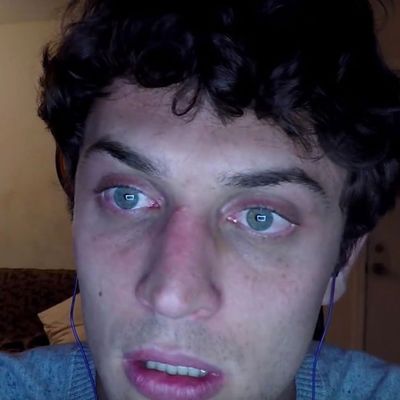
I tend to imagine Unfriended: Dark Web being a little hard to parse for viewers 10 or 20 years from now, but maybe thatÔÇÖs too optimistic. The opening shot is an image from our digital nightmares: a login screen on a clearly stolen Mac laptop, with login after login being entered in in vain. The trial-and-error process is as of-the-moment as a feature-length mass-market film can be: ÔÇ£feelthebern,ÔÇØ ÔÇ£covfefeÔÇØ are among the possible passwords typed in with increasing rapidity and impatience. IÔÇÖd like to hope that these references would all seem quaint and irrelevant ten years in the future, but who knows.
The original Unfriended was a teen horror trifle that dared you to dismiss its storytelling technique as pure gimmick. Taking place entirely on one laptop screen, the story unfolds through Skype sessions, Google searches, Facebook profiles, and Spotify playlists. In other words, how most of the stories we experience every day unfold. That technique was the innovation, not its actual story, which was more or less a spooky revenge-ghost tale about a dead girl that kills off our teen group one by one with varying degrees of streaming quality. Aside from its timely instigating factor ÔÇö a scandalous circulated video, cyberbullying-induced suicide ÔÇö the supernatural element made it almost cute; a kind of throwback story in newfangled form. Unfriended was not a scary movie.
In Dark Web, the threat is wholly of this world, which makes the sequel feel as though it comes from another universe entirely. It is scary, but it isnÔÇÖt much fun. Twenty-something Matias (Colin Woodell), hard up for a laptop, swipes one from the lost and found at a coffee shop. He just wants to be able to work on a program heÔÇÖs coding that lets him communicate with his deaf girlfriend Amaya (Stephanie Nogueras), but it soon becomes clear that the former owner of the laptop was involved in some Very Dark Stuff. While on a ÔÇ£game nightÔÇØ group Skype with his buddies, he begins to get weird messages from the former ownerÔÇÖs Facebook account, one thing leads to another, and soon heÔÇÖs found an improbably spooky Dark Web chat client (complete with River StyxÔÇôthemed graphical interface), a cabal of Dark Web overlords with seemingly godlike capabilities to track him and his friends down, and, oh yeah, a hidden cache of snuff films on the laptop.
The difference between Unfriended and Dark Web, the latter directed by Grudge scribe Stephen Susco, is the difference between I Know What You Did Last Summer and Last House on the Left. ItÔÇÖs a genuinely troubling depiction of the kind of hollow-eyed, hypnotic pull of Things We Are Not Supposed to See, whether thatÔÇÖs a viral video with a ÔÇ£sensitive contentÔÇØ warning slapped over it, or something more intentional and exploitative. It reminded me of Adrian ChenÔÇÖs Wired article on the contractors who scrub porn and beheadings from Facebook; it made me think of Kathryn BigelowÔÇÖs Strange Days, in which an almost impossible-to-watch POV recording of a rape and murder is the catalyst for a larger web of corruption and conspiracy. ThereÔÇÖs something unspeakably dark about the glassy-eyed glow in MatiasÔÇÖs eyes as he inspects video after video in the cache, while his friends, sharing his desktop view, become silent and morose, the women turning their faces from the monitor altogether. (This is also a subtle point in Strange Days: The men feel the need to expose themselves to the recording; Angela Bassett emphatically doesnÔÇÖt need it in her life.)
MatiasÔÇÖs run-in with the Dark Web overlords turns into a tense standoff: They threaten to kidnap his girlfriend if the laptop isnÔÇÖt returned, and as the clock runs down, each of his friends meets a different digitally assisted death. These range from good old-fashioned shoves off roofs to aggravated swatting to death by hacked subway train. They doctor photos and audio and frame the victims for heinous crimes; objective truth ÔÇö the safe space horror movies always run back to by the end ÔÇö is completely eradicated. As with its predecessor, the chill is not so much in the method of the murders as it is in the passive, laptop-camera view of them; thereÔÇÖs a helpless feeling in watching the inevitable happen, as the stream glitches out for extra-unsettling effect. WeÔÇÖre not even sure what weÔÇÖre looking at before weÔÇÖve already seen it and absorbed it, which is the case with everything that comes down oneÔÇÖs content feed.
In other words, Unfriended: Dark Web, despite a mostly far-fetched, hacky, and ÔÇö I suspect ÔÇö wildly technically inaccurate script, is equipped to explore a lot of very real digital horrors most contemporary film canÔÇÖt. Whereas the first film was a surprisingly effective formal exercise, Dark Web marries that form to an extremely real feeling of hopelessness that characterizes a not-small amount of our time spent online. Whether or not I can recommend the experience is another question ÔÇö Dark Web has more value as an artifact than a piece of entertainment. I left feeling more conscious than usual of the trajectory weÔÇÖre on ÔÇö not so much the elaborate, ultimately ridiculous ÔÇ£dark webÔÇØ the film weaves, but the world in which this movie resonates.

